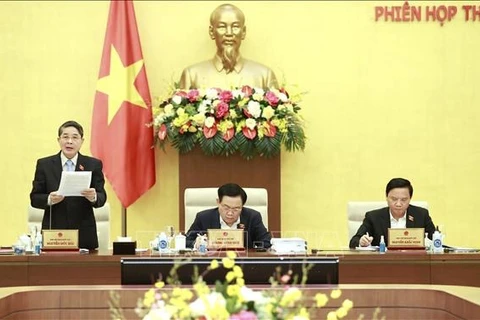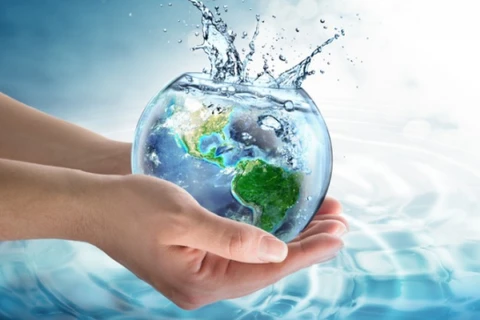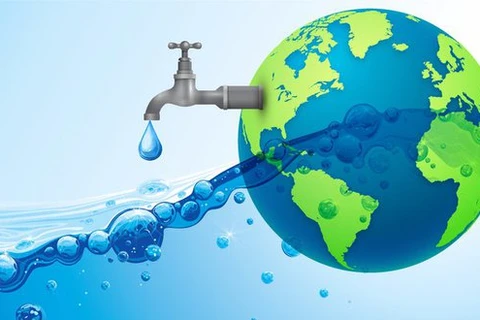Hanoi (VNA) – Vietnam’s water demand is likely to reach about 122 billion cu.m each year from 2030, 1.5 times higher than the current amount, which means water shortage may become severe if the country fails to effectively manage the resources, said Deputy Director of the Department of Water Resources Management under the Ministry of Natural Resources and Environment (MoNRE) Nguyen Minh Khuyen.
Khuyen noted that Vietnam is exploiting 84 billion cu.m of water each year, including 3.8 billion cu.m of underground and 80.6 billion cu.m of surface water. The peak water-consumption time is in the dry season from July to September when over 80% of water is used for agricultural activities, he said.
The official underlined that some localities have still faced difficulties in accessing clean and safe water, especially those in the central and southcentral regions. Particularly, the situation is even worse in the Mekong Delta region where saltwater intrusion is increasingly severe.
It is forecast that 11 out of the 16 major river basins of Vietnam will experience water stress, especially in the four main river basins from which 80% of Vietnam's GDP is generated, including the Red – Thai Binh river basin, Mekong River basin, Dong Nai River basin and the basins of rivers in the southeast region, he said.
As part of the efforts to better manage water resources, the Law on Water Resources was issued in 2012. So far, the Government and the MoNRE have promulgated nearly 70 documents, while localities have also issued nearly 500 others to guide the implementation of the law.
To date, six out of the 15 water resources planning have been approved. At the same time, among the 63 cities and provinces nationwide, said Khuyen.
However, he cited a comment from the World Bank (WB) and the UN Food and Agriculture Organisation (FAO) that Vietnam is a country with low water usage efficiency, especially the agricultural sector.
According to the World Bank's assessment in 2019, water used in agriculture accounted for 81% of Vietnam's total water consumption, but the sector currently generated only 17-18% of GDP and created jobs for 45% of the labour force.
Meanwhile, water wastage has remained, and the rate of water loss in urban and rural areas has still been high, at about 25%. The efficiency of water exploitation is much lower than the designed capacity of water works, especially those for irrigation and agriculture, said Khuyen.
He said that currently, the MoNRE is working on a draft revised Law on Water Resources, focusing on four key policies of ensuring water source security; socialising the water sector; promoting water economy; and protecting water resources and preventing harms caused by water.
In respond to this year’s World Water Day, themed “Accelerating Changes”, through various forms and methods, the MoNRE has spread messages of saving water to protect the planet, contributing to promoting social progress, and accessing safe water. Small actions will lead to great changes, he concluded./.
Khuyen noted that Vietnam is exploiting 84 billion cu.m of water each year, including 3.8 billion cu.m of underground and 80.6 billion cu.m of surface water. The peak water-consumption time is in the dry season from July to September when over 80% of water is used for agricultural activities, he said.
The official underlined that some localities have still faced difficulties in accessing clean and safe water, especially those in the central and southcentral regions. Particularly, the situation is even worse in the Mekong Delta region where saltwater intrusion is increasingly severe.
It is forecast that 11 out of the 16 major river basins of Vietnam will experience water stress, especially in the four main river basins from which 80% of Vietnam's GDP is generated, including the Red – Thai Binh river basin, Mekong River basin, Dong Nai River basin and the basins of rivers in the southeast region, he said.
As part of the efforts to better manage water resources, the Law on Water Resources was issued in 2012. So far, the Government and the MoNRE have promulgated nearly 70 documents, while localities have also issued nearly 500 others to guide the implementation of the law.
To date, six out of the 15 water resources planning have been approved. At the same time, among the 63 cities and provinces nationwide, said Khuyen.
However, he cited a comment from the World Bank (WB) and the UN Food and Agriculture Organisation (FAO) that Vietnam is a country with low water usage efficiency, especially the agricultural sector.
According to the World Bank's assessment in 2019, water used in agriculture accounted for 81% of Vietnam's total water consumption, but the sector currently generated only 17-18% of GDP and created jobs for 45% of the labour force.
Meanwhile, water wastage has remained, and the rate of water loss in urban and rural areas has still been high, at about 25%. The efficiency of water exploitation is much lower than the designed capacity of water works, especially those for irrigation and agriculture, said Khuyen.
He said that currently, the MoNRE is working on a draft revised Law on Water Resources, focusing on four key policies of ensuring water source security; socialising the water sector; promoting water economy; and protecting water resources and preventing harms caused by water.
In respond to this year’s World Water Day, themed “Accelerating Changes”, through various forms and methods, the MoNRE has spread messages of saving water to protect the planet, contributing to promoting social progress, and accessing safe water. Small actions will lead to great changes, he concluded./.
VNA

























